Вестник Южно-Уральского государственного университета. Серия: Образование. Педагогические науки @vestnik-susu-ped
Статьи журнала - Вестник Южно-Уральского государственного университета. Серия: Образование. Педагогические науки
Все статьи: 1051
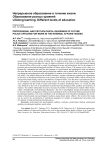
Статья научная
Currently, the entire world community is facing fundamental changes and reforms in many government structures and spheres of public life. In modern society, there is an increase in socially dangerous trends, which necessitates the need to improve education in the field of initial professional training of internal affairs officers and to search for pedagogical means and technologies for the development of personal and professional-pedagogical qualities of future police officers. The purpose of the study is to theoretically substantiate the need for the formation of psychological and pedagogical skills and qualities that form the basis of professional and psychological readiness and to identify the level of development of psychological and pedagogical skills and qualities of students of the higher school of the Ministry of Internal Affairs. The authors analyzed the scientific literature, normative documents regulating the organization of activities of educational institutions in the system of the Ministry of Internal Affairs; and the curricula for initial professional training courses at the Ministry of Internal Affairs. The data from a questionnaire survey of 350 students in initial professional training courses for senior, private and junior commanding officers were compared with the results of expert assessments of teachers conducting classes. As a result, the data were obtained on the level of development of professional psychological skills, qualities and resilience of students. The authors substantiate the need to increase the number of training hours studied within the discipline “Fundamentals of Psychological Readiness”, but also to meaningfully change the discipline content to develop students’ pedagogical, technical and psychological skills, professional thinking and professional psychological readiness. This work contributes to the development of the theoretical foundations for the formation of professional and psychological readiness among future police officers. The results of the study can be used in the development of educational programs for students at departmental universities and for students of initial professional training courses.
Бесплатно
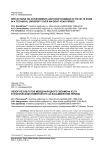
Статья научная
IELTS exam is an internationally recognized tool to measure students’ proficiency in academic English, and in anglophone countries it often plays a role of a gatekeeper to a university. At National University of Science and Technology MISiS (NUST MISiS) IELTS exam, on the contrary, completes a four-year long English course for all majors. IELTS exam was used as the unique KPI of the program effectiveness, enabling the department to monitor graduates’ proficiency throughout eight years, track its dynamics against the placement test levels, and oversee the factors which affect final results. The data obtained from 5600 engineering students revealed that no more than 50% could achieve the target B2/C1. There was a strong correlation between the entrance levels and final IELTS results, except for the COVID-19 year (KPI = 38%). Trajectories drawn for each starting level statistically confirm the primacy of this factor. The entrants with the initial A1 level could hardly achieve B2 (11%), while A2 cohort were in the zone of perspective growth (57%). Among other factors that impede setting higher KPI the authors name the nature of the university environment with the high flexibility of a student population, and their motivation to take IELTS. These findings demonstrate that actual effectiveness of a program can differ significantly from theoretical expectations, and this should be taken into account by course designers.
Бесплатно
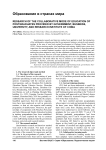
Статья научная
Questionnaire research and interview method were applied to study the introduction of the collaborative education provided by government, business, university and research institute in the area of rural and regional development at Zhejiang Ocean University (ZOU). Various training modes: joint enrollment and training, double-tutor system (two supervisors for one postgraduate, one is from the university, the other is from government or business or research institute) together with the establishment of collaborative staff training have been adopted to carry out the collaborative education that has provided better results. However, there are still some problems: misbalanced cooperation, unrelated cooperation fields that lead to the staff training objective not to be adequately met with practical needs. The article offers the way to construct a new training mode between government, business, university and research institute for the professional degree programme - Master of Rural and Regional Development.
Бесплатно
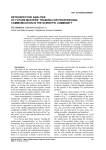
Статья научная
The problem of getting future masters ready for professional communication in the scientific community is considered on the basis of a retrospective analysis. This problem is influenced by the processes of internationalization in education and integration of scientific, educational and production areas. The historical retrospective is made on the basis of the following criteria: 1) the formation of masters' education, 2) the development of scientific communication, 3) the development of foreign language education, 4) the formation of language for professional purposes. Representing the historiography of the problem the author reveals three main periods: from 45th to 60s of the 20th century; from 70th to 90s of the 20th century; from the beginning of the 2000s to the present. The period before 1945 is considered a preparatory one. It created social, scientific and practical conditions for training future masters for professional communication in the scientific community.
Бесплатно
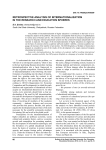
Retrospective analysis of internationalization in the research and education spheres
Статья научная
The problem of internationalization of higher education is considered on the basis of a retrospective analysis of the problem. This process is inseparable from the process of globalization in various areas of human activity. The evolution of the main trends in European education and the need to integrate national educational systems into the common-European educational environment is analyzed. The stages of the internationalization of higher education are singled out on the basis of common criteria: academic staff and students’ mobility, common academic language, the increase of the number of universities. The EMI (English as a Medium of Instruction) program is considered as one of the results of the development of a single common European educational environment.
Бесплатно
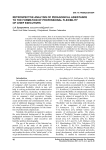
Статья научная
In a modernized economy, there is an increased need for quality training of company's chief executives with a high level of professional flexibility. The aim of this study is to identify socio-historical and theoretical-pedagogical preconditions for the formation and development of this quality in chief executives. This study analyses baseline data for further structuring and improving educational practices for professional flexibility formation. The understanding of the pedagogical assistance issue of professional flexibility formation of company's chief executives is based on a retrospective analysis. The historical retrospective is established on the following research subjects: “supplementary adult education”; “professional flexibility”; “pedagogical facilitation”; “targeting company's chief executives”. Representing the historiography of the problem the author reveals three historical periods: the 1st one is from the beginning of the 60s to the end of the 80s of the XX century; the 2nd period is from the end of the 80s of the XX century to the beginning of the 2000s; the 3rd period is from the beginning of the 2000 up to the present. The period before the 1960s is regarded as a preparatory one. It created social, scientific, and practical conditions for pedagogical assistance to the development of professional flexibility among company's chief executives.
Бесплатно
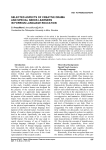
Selected aspects of creative drama and special needs learners in foreign language education
Статья научная
The main contribution of the article is the theoretical foundations and research results, which are presented in the context of teaching English as a foreign language to students with attention deficit hyperactivity disorder (ADHD). This article presents a selection of data from a longitude research project that took three years. In particular, it emphasizes the ability of a student with ADHD to respond in a foreign language and the ability to work in that language in a school setting. The article defines the main characteristics of students with ADHD and describes creative drama as an innovative approach to teaching foreign languages. The empirical data of a conducted research are presented. The empirical study was carried out in a secondary public school in the south of Slovakia. The sample for the study was carefully selected, and all data was kept in complete confidentiality. Further research and results are discussed in the following monograph written by the author.
Бесплатно
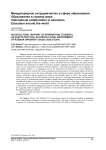
Статья научная
Russian universities strive to implement strategies to enter the global educational space and increase the number of international students, as this is the crucial indicator of a university’s success. The implementation of these strategies involves not only the introduction of innovation in the educational process, but also the creation of favorable conditions for international students. However, academic migrants have to adapt to these new conditions, as they will differ from the conditions in the home country. Although many institutions put efforts to maximize students’ adaptation and acculturation, the desired outcome is yet to come and the search for effective practices is still a pressing challenge. The organization of socio-cultural support as an adaptation tool in the intercultural environment is of great importance. The research aims to examine the current conceptions and best practices of sociocultural support in the academic environment, reveals the major challenges of the international students, identifies the international student’ satisfaction rate and suggests the model of sociocultural support in SUSU. The authors employ qualitative research with the data obtained from the interviews, classroom observations, and satisfaction survey among 30 international students. Modern concepts and certain practices of sociocultural support for international students in the Russian academic environment are examined, their major challenges are revealed, the level of satisfaction of international students with the quality of sociocultural support at SUSU is determined, sociocultural pedagogical model for student support is elaborated. The implementation of the suggested model is supposed to contribute to more efficient adaptation of international students into Russian educational environment.
Бесплатно
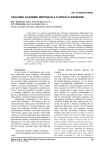
Teaching academic writing in a flipped classroom
Статья научная
In the context of a common educational space formation, international collaboration based on the principle of academic mobility is becoming of primary importance for universities and other higher educational institutions. Proficiency in English is the necessary requirement for international collaboration in education. To resolve the contradiction between the need for academic mobility and the low level of language proficiency, various language training courses are being initiated in educational institutions. In the South Ural State University, a Center of Academic Writing, educational program “Lingua”, and other courses for lecturers, postgraduates and undergraduates have been launched where teaching is conducted according to traditional methodology and using innovative technologies. The aim of the article is to analyze the existing advanced technologies and approaches to language teaching and to justify the choice of blended learning approach for teaching academic writing at the university. The article reveals the essence of the flipped classroom model, its advantages and disadvantages. The authors describe the experience of using the flipped classroom technology teaching the writing for research papers at the South Ural State University.
Бесплатно
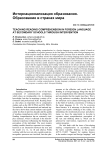
Teaching reading comprehension in foreign language at secondary schools through intervention
Статья научная
Teaching reading comprehension in a foreign language at secondary school is based on the stimulation of cognitive processes in the first stages of working with a foreign language text, which requires mainly the effort of simpler cognitive processes such as attention, memory and perception. At secondary school, the comprehension of a foreign language text acquires a new dimension; the student strives to understand both implicit and explicit information from the text and to make inferences about the text. Many times students are motivated to read, they read various texts, but they cannot respond to questions, which is also confirmed by testing. This means that the targeted reading and working with the text do not always develop comprehension. For this reason, we consider the practice and development of text comprehension through intervention to be extremely important. The article focuses on the specifics of foreign language reading and the intervention of reading comprehension in German, using intervention program as a tool for effective and complex development of reading comprehension. The criteria for compiling an intervention program are analyzed. The structure of the program, the plan of its experimental verification are worked out. We present an example of one intervention unit (methodical sheet) with the focus on stimulating the cognitive process of divergent thinking.
Бесплатно
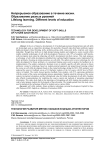
Technology for development of soft skills of future architects
Статья научная
In the era of intensive development of AI technologies personal characteristics and soft skills are increasingly seen as competitive advantages for specialists. Research states that future architects require highly-developed critical thinking skills, problem-solving skills, team-work skills, creativity and vision, leadership. Though these skills are in high demand among students and employers, scarce research offers readily available technologies of soft skills development. Moreover, only 19% of academic staff intentionally incorporate tasks aimed at enhancing soft skills’ development into their courses. This study proposes a technology of soft skills development embedded into teaching English language course implemented for future architects, focusing on raising awareness on soft skills. The authors aim to test a technology for soft skills development for future architects via customized training course and to analyze the feedback on its implementation. The authors conducted a literature review to identify specific soft skills relevant to future architects; created a technology based on student-centered approach and project-based learning; piloted the course on soft skills development based on the created technology during the 2023-2024 academic year; analyzed the course’s feedback survey of 33 Bachelor students of the 3rd course with B2 level of Proficiency in English. The results showed positive feedback from students, with 91% expressing satisfaction with the content of the course and education process organization. Students noted the relevance of the course content, its practical orientation, and the informational value for further development of soft skills. Students also offered recommendations for modifying the course content and methods of presenting educational information. This study sheds light on the importance of integrating soft skills training into academic curricula to better prepare students for the demands of the job market. The insights gained from this study can be used to implement the technology offered for students across various fields.
Бесплатно
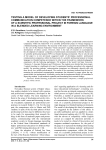
Статья научная
The article deals with testing a model of developing students’ professional communication competence within the framework of a scientific professional project in foreign language in a blended learning environment. The necessity of this study is caused by the amendments made to the Law of the Russian Federation “About education” regarding application of e-learning, development of online courses. However, there is the lack of research on accompanying the development of students’ competence of professional communication within the framework of scientific professional project (SPP) in a blended learning environment. That is why the aim of the paper is to test previously suggested model of developing students’ professional communication competence within the framework of a scientific professional project in foreign language in a blended learning environment. In order to test the model we conducted pedagogical experiment with the following participants: 350 students of the South Ural State University, 2 lecturers, 5 Associate Professors and 2 Professors. The students were divided into four groups: 2 control (teaching in a traditional style) and 2 experimental (teaching according to the suggested model). For assessing students’ communication competence we elaborated a special scale with three levels: low, middle and advanced. The results of the experiment indicate that the level of mastering the professional communication competence has increased in groups where the suggested model was implemented. It definitely proves that the implemented model will contribute to improving students’ world academic reputation and formulating their research findings.
Бесплатно
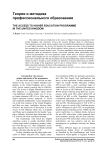
The Access to Higher Education programme in the United Kingdom
Статья научная
This article provides an introduction to the Access to Higher Education programme in the United Kingdom, and selectively reviews the research literature about its effectiveness. The programme gives mainly mature students from non-traditional backgrounds the opportunity to enter higher education. The review first describes the origins and nature of the programme, then examines the raw data of the official statistics, before going on to consider both quantitative and qualitative research studies in turn. The more quantitative studies into the programme’s effectiveness paint an inconclusive picture, with mixed evidence about achievement which is often not generalizable. The more qualitative studies which focus on learners’ experiences generate useful insights but are not designed to judge the programme’s overall effectiveness. The review concludes that while the programme has indeed benefited large numbers of students, further research is needed to assess whether any limitations in student achievement are attribu¬table to the design of the programme itself or due to external factors. In a rapidly changing higher education landscape, the future of the programme is unclear.
Бесплатно
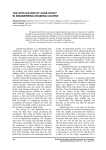
The application of case study in engineering drawing course
Статья научная
The paper describes the case study in engineering drawing course in the process of assembly drawing by using customized software. The process is reflecting three steps of an engineering case solving: design, processing and installation. Using case study for design drawings students can master the main components of assembly drawing, understand assembly drawing and learn the AutoCAD software. All this can improve the quality of teaching.
Бесплатно
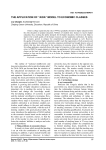
The application of “AIDA” model to economic classes
Статья научная
China’s college expansion plan since 1999 has gradually diverted its higher education from the elite education to popular education. Millions of students have chances to receive higher education, thus, meeting the public demands for the higher education, which not only helps to improve the overall quality of the human resources and the population cultivation, but pushes the economic growth to enhance the comprehensive national strength as well. However, the quality of the present higher education couldn’t reach the requirements of both economic and social development. Besides, the university expansion enrollment has brought about a series of defects that have been witnessed by the occurrence of economy crises in 2008. It is difficult for college graduates, especially those with major in Economics, to find a job after the economic crises in 2008.This paper attempts to discuss the application of AIDA method to the economic classes on the basis of analysis of the status quo of economic classes so that the role of the teacher in class can be redefined, so as to foster the students’ abilities to analyze and solve practical problems.
Бесплатно
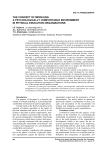
Статья научная
Current trends in the sphere of physical education and sports are reflected in the functioning of physical education organizations. One of the conditions for success is the creation and management of a psychologically comfortable environment. This article is an attempt to solve the problem of modeling a psychologically comfortable environment in physical education organizations in administrative, methodological and technological aspects. To consider the theoretical aspects of the problem and develop the concept, the methods of the literature review, analysis of sports organizations teachers’ professional activities, observation and modeling were used. The result of scientific research was the authors’ concept of modeling a psychologically comfortable environment in physical education organizations. The conceptual components of a psychologically comfortable environment were identified. They are emotional, cognitive, and behavioral ones. The problem of creating a psychologically comfortable environment in a physical education organization is considered taking into account the principles of parity and participativeness, which allow us to analyze the effectiveness of modeling a psychologically comfortable environment in an organization. Methodological and technological aspects of a practical solution to the problem are presented as the conditions for the implementation of the model developed by the authors. The conditions are: the formation of interpersonal relationships in a physical education organization based on the reference significance of the environment; psychological prevention and correction; the introduction of psychological strategies to support the employees of a physical education organization. These conditions and the concept were tested in a pilot version of the physical education organizations of Shadrinsk. The data obtained indicate the effectiveness of the concept and the conditions created.
Бесплатно
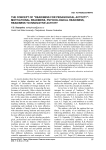
Статья научная
This article is a literature review that is done to compare and organize the results of the research on the concepts of “readiness” and “readiness for pedagogical activity”. Readiness for pedagogical activity is an important aspect of teacher formation and self-development throughout life. The importance of the topic is justified by the fact that there is a part of academic staff that is not ready to work in new conditions due to internationalization of higher education. The processes of globalization and introduction of innovative technologies force faculty to choose between preserving traditional methods of instruction and using new innovative technologies. A survey of SUSU academic staff showed that psychological barrier and internal fear of innovation prevent them from achieving their goals and being active participants in university life. Different approaches to the notion of readiness are considered in the article, two main positions are singled out: the quality of the individual and the condition; the components of readiness are studied: motivational, psychological, cognitive and volitional. Further, the concept of “readiness for pedagogical activity”, its structure and factors influencing the formation of readiness are analyzed. The article reveals the importance of the formation and development of motivational and psychological readiness for professional pedagogical activity. The changes in the motivational sphere at various stages of professionalization of an individual are considered, groups of motives for pedagogical activity are singled out.
Бесплатно
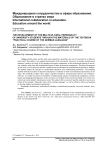
Статья научная
Both society and the state need competitive specialists who can be successful in a multicultural world. This ability is an integral characteristic of the personality. However, in modern research more attention is paid to the study of the language and speech components of the professional training of university students, rather than the multicultural aspects of their professional competence. Therefore, the purpose of our study is to develop and describe a methodic for the formation of multicultural personality of students. The authors analyze the concepts of “multicultural education” and “multicultural personality”. The modeling method allowed the authors to describe and propose a methodic to form the multicultural personality of students. The methodic includes three stages: cognitive-normative, communicative-activity and evaluative-reflexive. To model the process of formation of multicultural aspects of professional competence, psychological and pedagogical diagnostics of the awareness of students of the second and fourth year courses was carried out via the author's criterion-level scale. The authors offer a system of specific methods to use the materials of the textbook “Practical Course of the German language” as well as effective forms and methods to develop students' multicultural personality.
Бесплатно
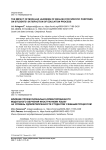
Статья научная
The development of the education system in Russia is considered as one of the most important strategic goals of the society. The professionalization of teaching a foreign language at the universities is a global trend. ESP (English for Specific Purposes) has become increasingly important as there has been an increase in vocational training and learning throughout the world. The article reveals the key theoretical and practical aspects of the system of modular learning in the South Ural State University, the Higher School of Electronic Engineering and Computer Science, as a new design for the teaching and learning cooperation. The principle of modular organization of educational material involves the organization of training in the form of professionally-oriented modules. The paper defines the term “module”, describes the criteria for selecting educational material, outlines the structure of a module and a set of exercises. The aim of our research was to study the satisfaction level of students with the quality of education and to analyze the implementation process of the modular learning. The following tasks were solved: the experience of using modular learning in educational process was analyzed, the level of students’ satisfaction with the quality of education system was evaluated. Theoretical (analysis of modern scientific and methodological literature) and empirical (questionnaire, mathematical processing of the obtained data) methods are applied in the study. The research shows that the implementation of modular learning had a positive impact on students' outcomes and the level of students` satisfaction with the education process increased.
Бесплатно
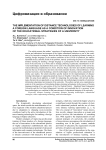
Статья научная
The article presents the authors' experience of implementing distance learning in the information and educational environment of the higher educational institution as one of the conditions of its innovative strategies. Based on the latest research on introducing distance learning in teaching foreign languages in the modern conditions of the COVID-19 pandemic, the authors identified the key semantic fields of the problem, namely: positioning the process of introducing distance learning for teaching a foreign language as a prerequisite for the innovative development of the university as a whole and its strategic planning in particular; identification of universal technologies and platforms that can be used in the educational process of the university: videoconferencing implemented on Zoom, Discord, Skype; television and satellite technology based on the use of interactive television: television and radio lectures, videoconferences, virtual practical exercises; email technology; network technologies for posting various educational materials; case studies. The article describes specific models for the implementation of distance learning technologies in organizing practical classes in English. It describes a step-by-step algorithm for using Zoom platform, a model for integrating this technology with network technologies that provide an opportunity to use educational and methodological materials of electronic information educational environment of the university. The authors carried out a comprehensive analysis of the experience of introducing distance learning technologies in the process of foreign language teaching of two universities of the Ural Federal District - Shadrinsk State Pedagogical University and the Ural State Pedagogical University and concluded that it is necessary to use these technologies as a condition for the innovativeness of educational strategies of the university.
Бесплатно

